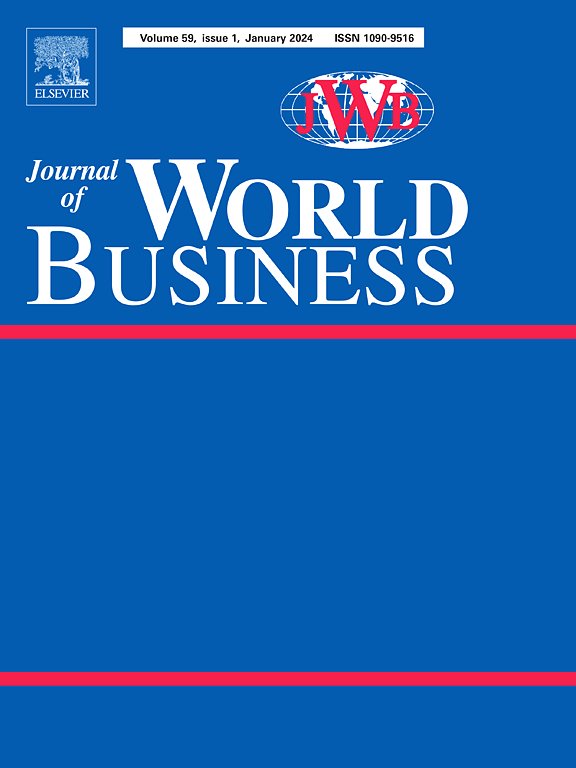Taking a time-out from exporting: Implications for the likelihood of export re-entry and re-entry export performance
IF 8.9
1区 管理学
Q1 BUSINESS
引用次数: 3
Abstract
Drawing from Organizational Learning Theory, we explain how the “time-out period” from exporting affects a) the likelihood of re-starting exporting and b) re-entry export performance. We also explain how foreign collaboration influences these two relationships. We show that the time-out period has an inverted U-shaped relationship with the likelihood of re-starting exporting, and a U-shaped relationship with re-entry export performance. Foreign collaboration enhances managerial confidence and thereby increases the likelihood of re-starting exporting during the earlier phases of the time-out period. It also enhances re-entry export performance by accelerating new knowledge accumulation in the later phases of the time-out period.
暂停出口:对出口重新进入和重新进入出口绩效的可能性的影响
根据组织学习理论,我们解释了出口的“暂停期”如何影响a)重新开始出口的可能性和b)重新进入出口的绩效。我们还解释了外国合作如何影响这两种关系。我们发现,超时时间与重新开始出口的可能性呈倒u型关系,与重新进入出口的绩效呈u型关系。外国合作提高了管理方面的信心,从而增加了在暂停期间的早期阶段重新开始出口的可能性。它还通过加速暂停期后期的新知识积累来提高再入出口绩效。
本文章由计算机程序翻译,如有差异,请以英文原文为准。
求助全文
约1分钟内获得全文
求助全文
来源期刊

Journal of World Business
BUSINESS-
CiteScore
16.50
自引率
11.20%
发文量
73
期刊介绍:
The Journal of World Business holds a distinguished position as a leading publication within the realm of International Business. Rooted in a legacy dating back to 1965, when it was established as the Columbia Journal of World Business, JWB is committed to disseminating cutting-edge research that reflects significant advancements in the field. The journal actively seeks submissions that propel new theoretical frameworks and innovative perspectives on International Business phenomena. Aligned with its domain statement, submissions are expected to possess a clear multinational, cross-border, or international comparative focus, while remaining pertinent to the study of management and organizations. JWB particularly encourages submissions that challenge established theories or assumptions, presenting pioneering or counterintuitive findings. With an inclusive approach, the journal welcomes contributions from diverse conceptual and theoretical traditions, encompassing allied social sciences and behavioral sciences. Submissions should either develop new theories or rigorously test existing ones, employing a variety of qualitative, quantitative, or other methodological approaches. While JWB primarily caters to scholars and researchers, it values contributions that explore implications for Multinational Enterprises and their management, as well as ramifications for public policy and the broader societal role of business.
 求助内容:
求助内容: 应助结果提醒方式:
应助结果提醒方式:


